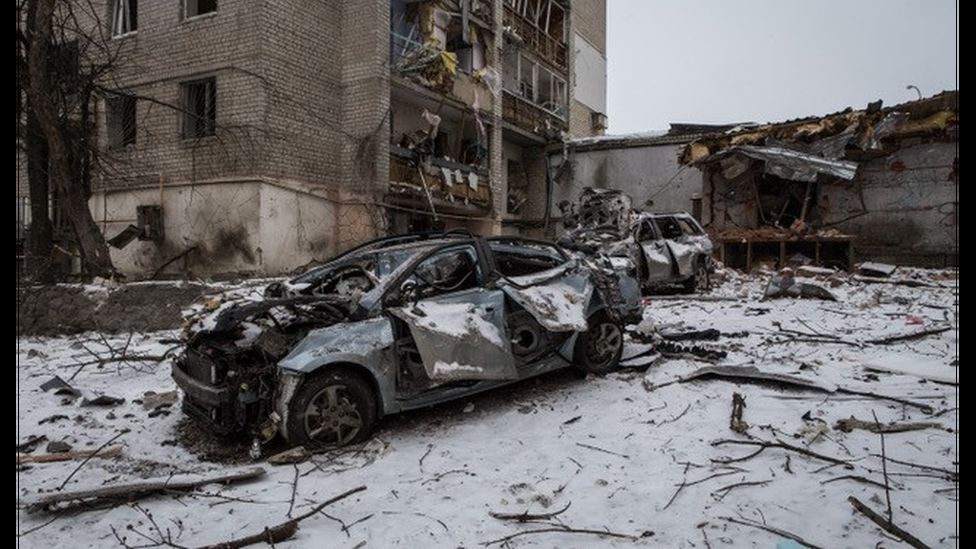Russia-Ukraine war: A warm hug meant that war had begun
 Image source, Intellias
Image source, IntelliasOlha Svyripa was woken up at 5.30am on 24 February to what she described as "the warmest hug I ever had from my husband".
"He said 'please wake up, it's begun'."
Two hours later, she was crammed into a small van with her husband, her best friend and four strangers, to begin what turned into an 18-hour journey from Kyiv to the relative safety of Rivne, in the west of Ukraine.
"We packed the most important stuff - documents, laptops, chargers. My husband filled my backpack with books and said: 'It might be heavy but will protect you in case of shelling'."


- Hear more from tech workers in Ukraine on this week's Tech Tent
- Also on the show we discuss whether Russia is going to cut itself off from the internet
- Plus how much of the conflict is being played out in real-time on social media
- And how one man is running a mass email campaign to counter disinformation about the conflict

Olha's laptop was important because she, like many Ukrainians, wanted to carry on working despite the complete upheaval of her life and the dreadful circumstances she found herself in.
Doing so, she told the BBC, takes her mind off "the endless stream of news, and the constant anxiety" for her friends in the cities that are being heavily shelled.
She works for software firm Intellias, and the same story is told by many of her colleagues.
Oleksandr Bilyk lived in Kharkiv, close to the Russian border, and he knew that war was coming.
 Image source, Getty Images
Image source, Getty Images"Even in my worst scenario, I couldn't imagine we would wake up at 4.30am to explosions. But we did."
They gathered together all their family members - including their two-year-old son - and in the two family cars they embarked on a three-day drive west to Ivano-Frankivsk,
"The road was awful, hundreds of people leaving the city. At some point my wife had to breastfeed and she did it without stopping the car."
Co-workers and friends helped them in the two cities they stopped at along the way, and the local team from Intellias helped find them an apartment when they arrived. On the following Monday, Oleksandr went back to work.
"Every day I go to the office and try to close the urgent tasks while my beautiful city gets destroyed."
He also makes daily phone calls to friends left in Kharkiv: "I just hope they will answer the call."
The firm, like many others, has tried to relocated its employees to either the west of Ukraine or to Krakow in neighbouring Poland.
Covid helped
Andrew Pavliv is the chief executive of software firm N-iX, one of the largest in Ukraine. Since the conflict began, many of his employees have relocated to Lviv, where he is based. He has even moved out of his home to accommodate some staff.
He told the BBC that his firm is operating at about 80% of its usual capacity, serving a range of clients from around the world: "We think that it is an important part of war to give people work and keep paying taxes. People like to work," he told the BBC.
He said that the Covid pandemic "has helped" because it meant people had become used to working remotely.
But the scale of invasion took him by surprise: "We expected that something would happen and we were ready for the conflict escalating in the east. The scale is much bigger than we expected, but we quickly reorganised.
"Our company works with the army and we are helping with connectivity for government institutions and - in cyber-security - our professionals are helping special forces."



No comments